高考反义疑问句讲解
高中英语反义疑问句的讲解介绍
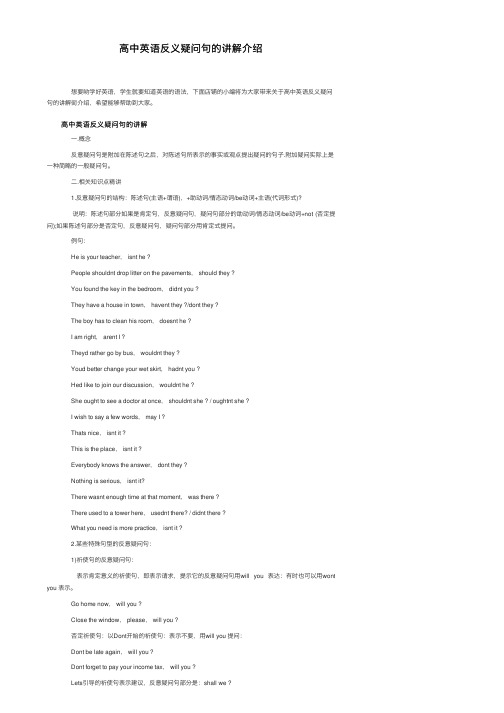
⾼中英语反义疑问句的讲解介绍 想要哟学好英语,学⽣就要知道英语的语法,下⾯店铺的⼩编将为⼤家带来关于⾼中英语反义疑问句的讲解街介绍,希望能够帮助到⼤家。
⾼中英语反义疑问句的讲解 ⼀.概念 反意疑问句是附加在陈述句之后,对陈述句所表⽰的事实或观点提出疑问的句⼦.附加疑问实际上是⼀种简略的⼀般疑问句。
⼆.相关知识点精讲 1.反意疑问句的结构:陈述句(主语+谓语),+助动词/情态动词/be动词+主语(代词形式)? 说明:陈述句部分如果是肯定句,反意疑问句,疑问句部分的助动词/情态动词/be动词+not (否定提问);如果陈述句部分是否定句,反意疑问句,疑问句部分⽤肯定式提问。
例句: He is your teacher, isnt he ? People shouldnt drop litter on the pavements, should they ? You found the key in the bedroom, didnt you ? They have a house in town, havent they ?/dont they ? The boy has to clean his room, doesnt he ? I am right, arent I ? Theyd rather go by bus, wouldnt they ? Youd better change your wet skirt, hadnt you ? Hed like to join our discussion, wouldnt he ? She ought to see a doctor at once, shouldnt she ? / oughtnt she ? I wish to say a few words, may I ? Thats nice, isnt it ? This is the place, isnt it ? Everybody knows the answer, dont they ? Nothing is serious, isnt it? There wasnt enough time at that moment, was there ? There used to a tower here, usednt there? / didnt there ? What you need is more practice, isnt it ? 2.某些特殊句型的反意疑问句: 1)祈使句的反意疑问句: 表⽰肯定意义的祈使句,即表⽰请求,提⽰它的反意疑问句⽤will you 表达:有时也可以⽤wont you 表⽰。
高考英语反义疑问句用法
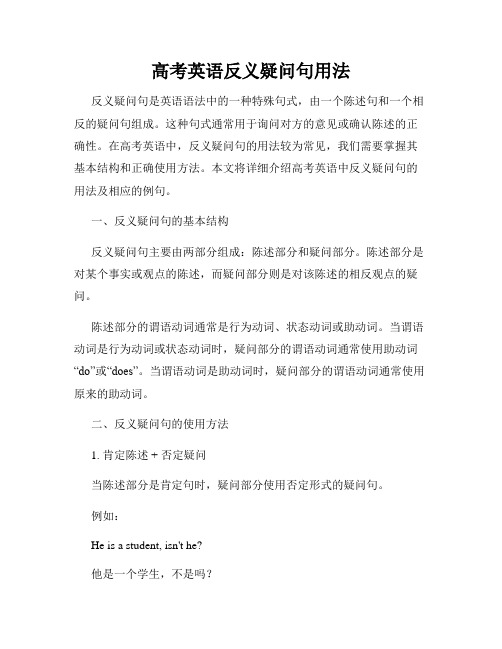
高考英语反义疑问句用法反义疑问句是英语语法中的一种特殊句式,由一个陈述句和一个相反的疑问句组成。
这种句式通常用于询问对方的意见或确认陈述的正确性。
在高考英语中,反义疑问句的用法较为常见,我们需要掌握其基本结构和正确使用方法。
本文将详细介绍高考英语中反义疑问句的用法及相应的例句。
一、反义疑问句的基本结构反义疑问句主要由两部分组成:陈述部分和疑问部分。
陈述部分是对某个事实或观点的陈述,而疑问部分则是对该陈述的相反观点的疑问。
陈述部分的谓语动词通常是行为动词、状态动词或助动词。
当谓语动词是行为动词或状态动词时,疑问部分的谓语动词通常使用助动词“do”或“does”。
当谓语动词是助动词时,疑问部分的谓语动词通常使用原来的助动词。
二、反义疑问句的使用方法1. 肯定陈述 + 否定疑问当陈述部分是肯定句时,疑问部分使用否定形式的疑问句。
例如:He is a student, isn't he?他是一个学生,不是吗?2. 否定陈述 + 肯定疑问当陈述部分是否定句时,疑问部分使用肯定形式的疑问句。
例如:She doesn't speak French, does she?她不会说法语,对吗?3. 陈述部分有实义动词如果陈述部分有实义动词(非助动词),则疑问部分使用助动词“do”或“does”。
例如:They like playing basketball, don't they?他们喜欢打篮球,对吗?4. 陈述部分有助动词如果陈述部分有助动词,则疑问部分使用原来的助动词。
例如:You can swim, can't you?你会游泳,对吗?5. 以let's开头的陈述句以let's开头的陈述句,疑问部分使用shall we。
例如:Let's go to the park, shall we?我们去公园吧,好吗?三、高考英语中的应用示例1. 完成句子The weather is nice today, ________?天气今天不错,是吗?2. 完成句子Tom isn't coming to the party, ________?汤姆不来参加聚会,是吗?3. 完成句子She will never forget this experience, ________?她永远不会忘记这个经历,对吗?4. 完成句子They have already finished their homework, ________?他们已经完成作业了,是吗?5. 完成句子Let's study harder for the exam, ________?让我们更努力地为考试学习,好吗?总结:反义疑问句是高考英语中的常见语法现象,掌握好其基本结构和正确使用方法对于理解和运用该句式非常重要。
反意疑问句讲解_修改版
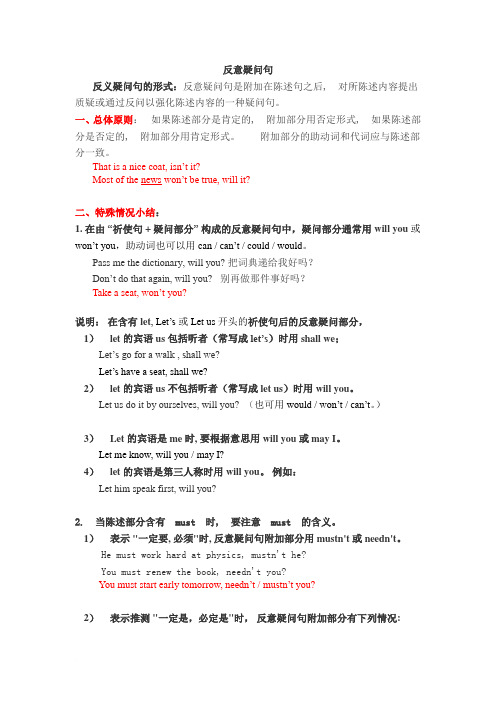
反意疑问句反义疑问句的形式:反意疑问句是附加在陈述句之后, 对所陈述内容提出质疑或通过反问以强化陈述内容的一种疑问句。
一、总体原则:如果陈述部分是肯定的, 附加部分用否定形式, 如果陈述部分是否定的, 附加部分用肯定形式。
附加部分的助动词和代词应与陈述部分一致。
That is a nice coat, isn’t it?Most of the news won’t be true, will it?二、特殊情况小结:1. 在由“祈使句 + 疑问部分”构成的反意疑问句中,疑问部分通常用will you或won’t you,助动词也可以用can / can’t / could / would。
Pass me the dictionary, will you? 把词典递给我好吗?Don’t do that again, will you?别再做那件事好吗?Take a seat, won’t you?说明:在含有let, Let’s或Let us开头的祈使句后的反意疑问部分,1)let的宾语us包括听者(常写成let’s)时用shall we;Let’s go for a walk , shall we?Let’s have a seat, shall we?2)let的宾语us不包括听者(常写成let us)时用will you。
Let us do it by ourselves, will you? (也可用would / won’t / can’t。
)3)Let的宾语是me时, 要根据意思用will you或may I。
Let me know, will you / may I?4)let的宾语是第三人称时用will you。
例如:Let him speak first, will you?2. 当陈述部分含有must 时, 要注意must 的含义。
1)表示 "一定要, 必须"时, 反意疑问句附加部分用 mustn't 或 needn't。
高中英语反义疑问句(详细)
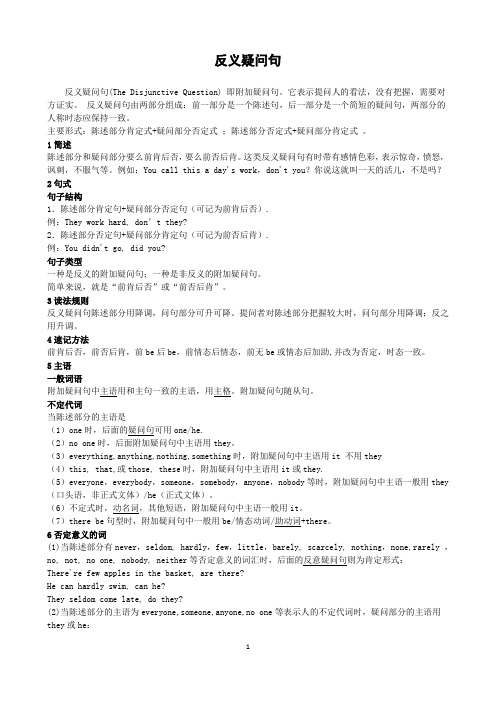
反义疑问句反义疑问句(The Disjunctive Question) 即附加疑问句。
它表示提问人的看法,没有把握,需要对方证实。
反义疑问句由两部分组成:前一部分是一个陈述句,后一部分是一个简短的疑问句,两部分的人称时态应保持一致。
主要形式:陈述部分肯定式+疑问部分否定式;陈述部分否定式+疑问部分肯定式。
1简述陈述部分和疑问部分要么前肯后否,要么前否后肯。
这类反义疑问句有时带有感情色彩,表示惊奇,愤怒,讽刺,不服气等。
例如:You call this a day's work,don't you?你说这就叫一天的活儿,不是吗?2句式句子结构1.陈述部分肯定句+疑问部分否定句(可记为前肯后否).例:They work hard, don’t they?2.陈述部分否定句+疑问部分肯定句(可记为前否后肯).例:You didn't go, did you?句子类型一种是反义的附加疑问句;一种是非反义的附加疑问句。
简单来说,就是“前肯后否”或“前否后肯”。
3读法规则反义疑问句陈述部分用降调,问句部分可升可降。
提问者对陈述部分把握较大时,问句部分用降调;反之用升调。
4速记方法前肯后否,前否后肯,前be后be,前情态后情态,前无be或情态后加助,并改为否定,时态一致。
5主语一般词语附加疑问句中主语用和主句一致的主语,用主格。
附加疑问句随从句。
不定代词当陈述部分的主语是(1)one时,后面的疑问句可用one/he.(2)no one时,后面附加疑问句中主语用they。
(3)everything,anything,nothing,something时,附加疑问句中主语用it 不用they(4)this, that,或those, these时,附加疑问句中主语用it或they.(5)everyone,everybody,someone,somebody,anyone,nobody等时,附加疑问句中主语一般用they (口头语,非正式文体)/he(正式文体)。
反义疑问句讲解及答案
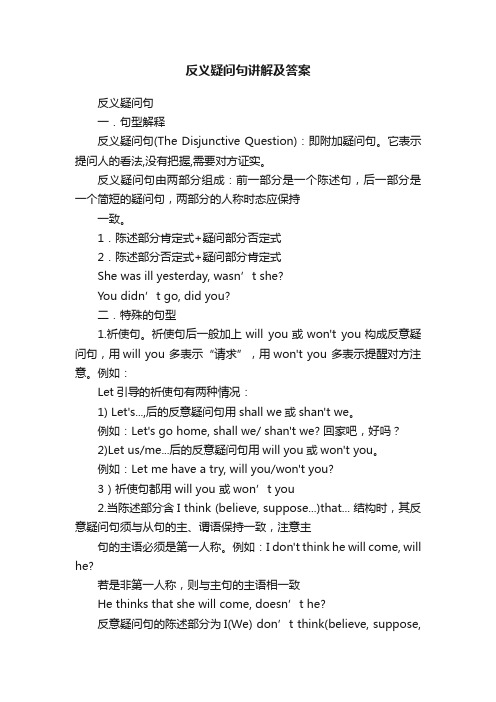
反义疑问句讲解及答案反义疑问句一.句型解释反义疑问句(The Disjunctive Question):即附加疑问句。
它表示提问人的看法,没有把握,需要对方证实。
反义疑问句由两部分组成:前一部分是一个陈述句,后一部分是一个简短的疑问句,两部分的人称时态应保持一致。
1.陈述部分肯定式+疑问部分否定式2.陈述部分否定式+疑问部分肯定式She was ill yesterday, wasn’t she?You didn’t go, did you?二.特殊的句型1.祈使句。
祈使句后一般加上will you或won't you构成反意疑问句,用will you 多表示“请求”,用won't you 多表示提醒对方注意。
例如:Let引导的祈使句有两种情况:1) Let's...,后的反意疑问句用shall we或shan't we。
例如:Let's go home, shall we/ shan't we? 回家吧,好吗?2)Let us/me...后的反意疑问句用will you或won't you。
例如:Let me have a try, will you/won't you?3)祈使句都用will you 或won’t you2.当陈述部分含I think (believe, suppose...)that... 结构时,其反意疑问句须与从句的主、谓语保持一致,注意主句的主语必须是第一人称。
例如:I don't think he will come, will he?若是非第一人称,则与主句的主语相一致He thinks that she will come, doesn’t he?反意疑问句的陈述部分为I(We) don’t think(believe, suppose,consider)+ that从句时,从句为否定意义,问句部分的动词和主语仍与that从句保持一致且用肯定式。
高考英语重点语法复习反义疑问句

高考英语重点语法复习反义疑问句Standardization of sany group #QS8QHH-HHGX8Q8-GNHHJ8-HHMHGN#反义疑问句反义疑问句(The Disjunctive Question)又叫附加疑问句(Tag Question)。
在口语中,反义疑问句用于发起谈话、询问信息或是礼貌的请求别人去做某件事。
反义疑问句由两部分组成:前一部分是一个陈述句,后一部分是一个简短的疑问句,两部分的人称时态应保持一致。
总体规则一、反义疑问句的语调1、在说话人知道问题的答案,使用反义疑问句表示请求赞同时,后面的反义疑问句部分用降调。
That film was fantastic, wasn't it ↘2、在说话人不明确问题的答案,使用反义疑问句表示说话人需要核实信息时,后面的反义疑问句部分用升调。
You don't know where the boss is, do you ↗二、反意疑问句中的对应规则:1、反意疑问句中问句部分的谓语动词与陈述部分的谓语动词在语气上成相反的对应关系,即:肯定+否定否定+肯定?①You can’t do it, can you?②They are very late for the meeting, aren’t they?2、反意疑问句中问句部分的动词与陈述部分的动词种类要对应一致。
如:①He has supper at home every day, doesn’t he (不能用hasn’t he)②They have known the matter, haven’t they (不能用don’t they)3、反意疑问句中问句部分的动词在时态上应和陈述部分的时态一致。
如:①They will go to town soon, won’t they (不能用don’t they或aren’t they)②He works very hard, doesn’t he (不能用didn’t he或won’t he)注:当陈述部分是I think 加从句时,疑问句应和从句的人称时态保持一致。
反意疑问句讲解_修改版
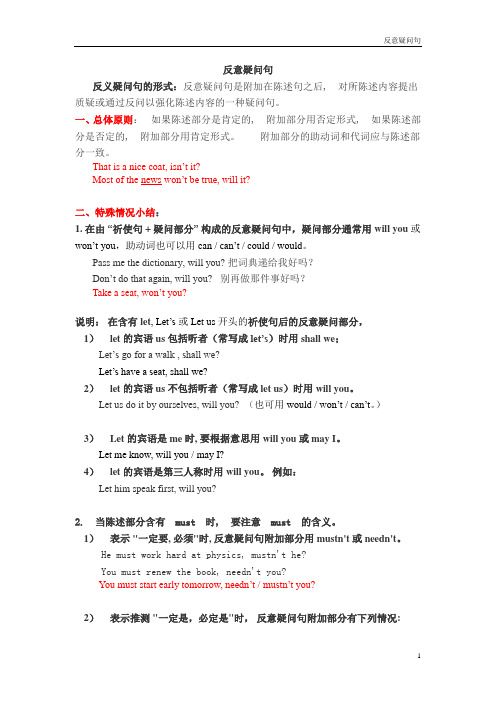
反意疑问句反义疑问句的形式:反意疑问句是附加在陈述句之后, 对所陈述内容提出质疑或通过反问以强化陈述内容的一种疑问句。
一、总体原则:如果陈述部分是肯定的, 附加部分用否定形式, 如果陈述部分是否定的, 附加部分用肯定形式。
附加部分的助动词和代词应与陈述部分一致。
That is a nice coat, isn’t it?Most of the news won’t be true, will it?二、特殊情况小结:1. 在由“祈使句 + 疑问部分”构成的反意疑问句中,疑问部分通常用will you或won’t you,助动词也可以用can / can’t / could / would。
Pass me the dictionary, will you? 把词典递给我好吗?Don’t do that again, will you?别再做那件事好吗?Take a seat, won’t you?说明:在含有let, Let’s或Let us开头的祈使句后的反意疑问部分,1)let的宾语us包括听者(常写成let’s)时用shall we;Let’s go for a walk , shall we?Let’s have a seat, shall we?2)let的宾语us不包括听者(常写成let us)时用will you。
Let us do it by ourselves, will you? (也可用would / won’t / can’t。
)3)Let的宾语是me时, 要根据意思用will you或may I。
Let me know, will you / may I?4)let的宾语是第三人称时用will you。
例如:Let him speak first, will you?2. 当陈述部分含有 must 时, 要注意 must 的含义。
1)表示 "一定要, 必须"时, 反意疑问句附加部分用 mustn't 或 needn't。
高考反义疑问句讲解(2020年九月整理).doc
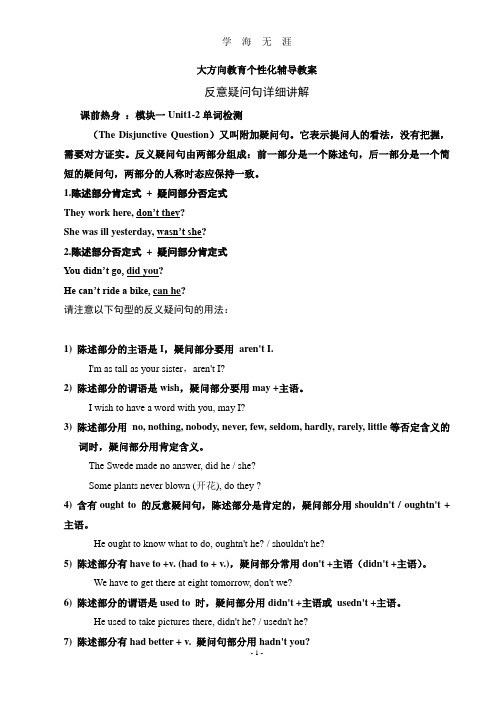
大方向教育个性化辅导教案反意疑问句详细讲解课前热身:模块一Unit1-2单词检测(The Disjunctive Question)又叫附加疑问句。
它表示提问人的看法,没有把握,需要对方证实。
反义疑问句由两部分组成:前一部分是一个陈述句,后一部分是一个简短的疑问句,两部分的人称时态应保持一致。
1.陈述部分肯定式+ 疑问部分否定式They work here, don’t they?She was ill yesterday, wasn’t she?2.陈述部分否定式+ 疑问部分肯定式You didn’t go, did you?He can’t ride a bike, can he?请注意以下句型的反义疑问句的用法:1) 陈述部分的主语是I,疑问部分要用aren't I.I'm as tall as your sister,aren't I?2) 陈述部分的谓语是wish,疑问部分要用may +主语。
I wish to have a word with you, may I?3) 陈述部分用no, nothing, nobody, never, few, seldom, hardly, rarely, little等否定含义的词时,疑问部分用肯定含义。
The Swede made no answer, did he / she?Some plants never blown (开花), do they ?4) 含有ought to 的反意疑问句,陈述部分是肯定的,疑问部分用shouldn't / oughtn't +主语。
He ought to know what to do, oughtn't he? / shouldn't he?5) 陈述部分有have to +v. (had to + v.),疑问部分常用don't +主语(didn't +主语)。
- 1、下载文档前请自行甄别文档内容的完整性,平台不提供额外的编辑、内容补充、找答案等附加服务。
- 2、"仅部分预览"的文档,不可在线预览部分如存在完整性等问题,可反馈申请退款(可完整预览的文档不适用该条件!)。
- 3、如文档侵犯您的权益,请联系客服反馈,我们会尽快为您处理(人工客服工作时间:9:00-18:30)。
大方向教育个性化辅导教案反意疑问句详细讲解课前热身:模块一Unit1-2单词检测(The Disjunctive Question)又叫附加疑问句。
它表示提问人的看法,没有把握,需要对方证实。
反义疑问句由两部分组成:前一部分是一个陈述句,后一部分是一个简短的疑问句,两部分的人称时态应保持一致。
1.陈述部分肯定式+ 疑问部分否定式They work here, don’t they?She was ill yesterday, wasn’t she?2.陈述部分否定式+ 疑问部分肯定式You didn’t go, did you?He can’t ride a bike, can he?请注意以下句型的反义疑问句的用法:1) 陈述部分的主语是I,疑问部分要用aren't I.I'm as tall as your sister,aren't I?2) 陈述部分的谓语是wish,疑问部分要用may +主语。
I wish to have a word with you, may I?3) 陈述部分用no, nothing, nobody, never, few, seldom, hardly, rarely, little等否定含义的词时,疑问部分用肯定含义。
The Swede made no answer, did he / she?Some plants never blown (开花), do they ?4) 含有ought to 的反意疑问句,陈述部分是肯定的,疑问部分用shouldn't / oughtn't +主语。
He ought to know what to do, oughtn't he? / shouldn't he?5) 陈述部分有have to +v. (had to + v.),疑问部分常用don't +主语(didn't +主语)。
We have to get there at eight tomorrow, don't we?6) 陈述部分的谓语是used to 时,疑问部分用didn't +主语或usedn't +主语。
He used to take pictures there, didn't he? / usedn't he?7) 陈述部分有had better + v. 疑问句部分用hadn't you?You'd better read it by yourself, hadn't you?8) 陈述部分有would rather +v.,疑问部分多用wouldn't +主语。
He would rather read it ten times than recite it, wouldn't he?9) 陈述部分有You'd like to +v. 疑问部分用wouldn't +主语。
You'd like to go with me, wouldn't you?11) 感叹句中,疑问部分用be +主语。
What colours, aren't they? What a smell, isn't it?12) 陈述部分由neither… nor, either… or 连接的并列主语时,疑问部分根据其实际逻辑意义而定。
Neither you nor I am engineer, are we?13) 陈述部分主语是指示代词或不定代词everything, that, nothing, this, 疑问部分主语用it。
Everything is ready, isn't it?14) 陈述部分为主语从句或并列复合句,疑问部分有三种情况:a. 并列复合句疑问部分,谓语动词根据邻近从句的谓语而定。
Mr. Smith had been to Beijing for several times, he should have been in China now, shouldn't he?b. 带有定语从句,宾语从句的主从复合句,疑问部分谓语根据主句的谓语而定:He is not the man who gave us a talk, is he?He said he wanted to visit Japan, didn't he?c. 上述部分主句谓语是think, believe, expect, suppose, imagine等引导的定语从句,疑问部分与宾语从句相对应构成反意疑问句。
I don't think he is bright, is he?We believe she can do it better, can't she?15) 陈述部分主语是不定代词everybody, anyone, somebody, nobody, no one等,疑问部分常用复数they,有时也用单数he。
Everyone knows the answer, don't they? (doesn’t he?)Nobody knows about it, do they? (does he?)16) 带情态动词dare或need的反意疑问句,疑问部分常用need (dare ) +主语。
We need not do it again, need we ? He dare not say so, dare you?当dare, need 为实义动词时,疑问部分用助动词do + 主语。
She doesn't dare to go home alone, does she?17) 省去主语的祈使句的反意疑问句,疑问部分用will you。
Don't do that again, will you? Go with me, will you / won't you ?注意:Let's 开头的祈使句,后用shall we?Let us 开头的祈使句,后用will you?Let's go and listen to the music, shall we?18) 陈述部分是"there be"结构的,疑问部分用there省略主语代词。
There is something wrong with your watch, isn't there?There will not be any trouble, will there?19) 否定前缀不能视为否定词,其反意疑问句仍用否定形式。
It is impossible, isn't it? He is not unkind to his classmates, is he?20)must在表"推测"时,根据其推测的情况来确定反意疑问句。
He must be there now, isn't he? It must be going to rain tomorrow, won't it?快速记忆表1.陈述部分的谓语疑问部分2.I aren't I3.Wish may +主语4.No ,nothing nobody, never ,few, seldom, hardly, rarely, little等否定含义的词肯定含义5.ought to(肯定的)shouldn't/ oughtn't +主语6.have to+v.(had to+v.) don't +主语(didn't +主语)ed to didn't +主语或usedn't +主语8.had better + v. hadn't you9.would rather + v. wouldn't +主语10.you'd like to + v. wouldn't +主语11.must 根据实际情况而定12.感叹句中be +主语13.Neither…nor, either…or 根据其实际逻辑意义而定14.指示代词或不定代词everything ,that, nothing ,this 主语用it15.并列复合句谓语根据邻近从句的谓语而定16.定语从句,宾语从句的主从复合句谓语根据邻近从句的谓语而定17.主从复合句根据主句的谓语而定18.Think ,believe, expect, suppose, imagine等引导与宾语从句相对应的从句19.Everybody ,anyone, somebody, nobody ,no one 复数they, 单数he20.情态动词dare或need need (dare ) +主语21.dare, need 为实义动词do +主语22.省去主语的祈使句will you?23.Let's 开头的祈使句Shall we?24.Let us 开头的祈使句Will you?25.there be 相应的谓语动词+there(省略主语代词)26.否定前缀不能视为否定词仍用否定形式浅谈英语的反意疑问句的特殊形式一、祈使句后的反意疑问句:祈使句后加一个反意疑问句,使祈使句变得更加委婉。
肯定祈使句的反意疑问句通常用will you, won’t you, would you, can you, can’t you等来表达不同的含义。
在否定的祈使句后的反意疑问句通常只用will you。
1、表示“请求”,肯定祈使句的反意疑问句用will you。
如:①Give me a hand, will you? ②Pass me a book, will you?2、表示“邀请”、“劝诱”时,肯定祈使句后的反意疑问句用won’t you。
如:Have another cup of tea, won’t y ou?3、表示“催促”、“不耐烦”时,肯定祈使句后的反意疑问句用can’t you。
如:Stop talking, can’t you?4、用“Let’s…”开头的肯定祈使句表示“提议、建议、主张”,其后的反意疑问句用shall we。
如:Let’s have a try, shall we?但是以Let us…或Let me…开头的祈使句后的反意疑问句则要用will you。
如:Let us go now, will you?5、否定祈使句的反意疑问句只用will you。
